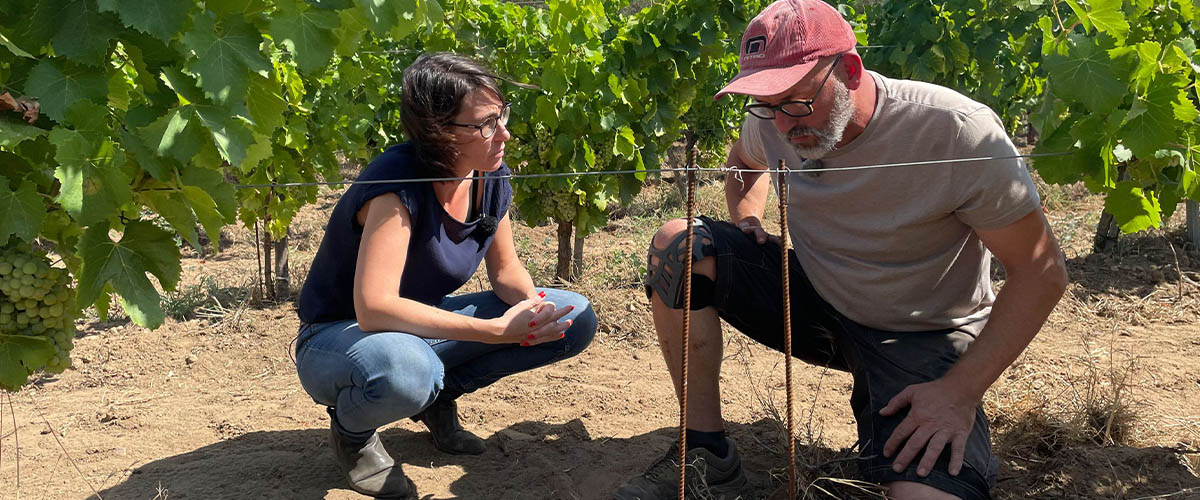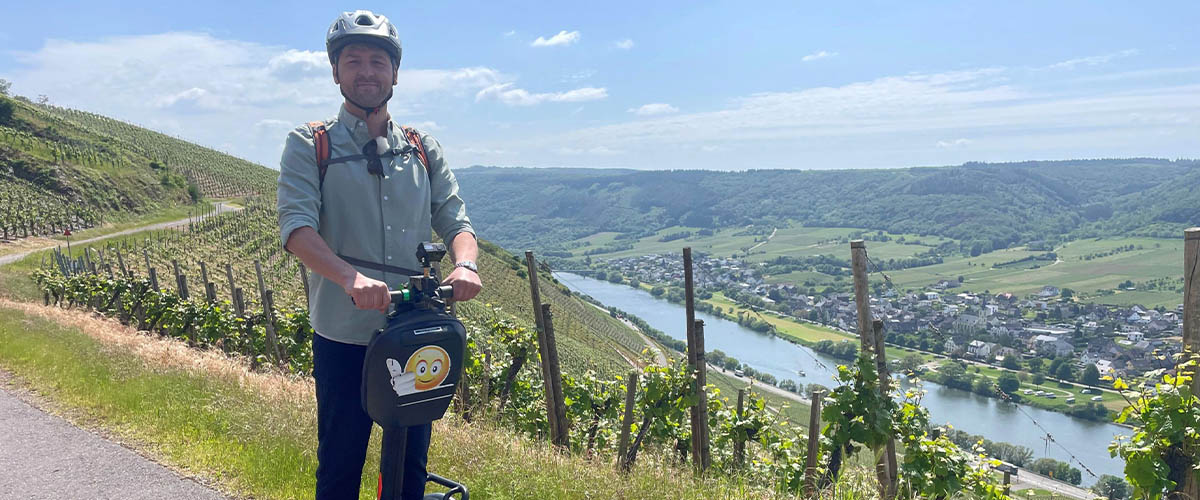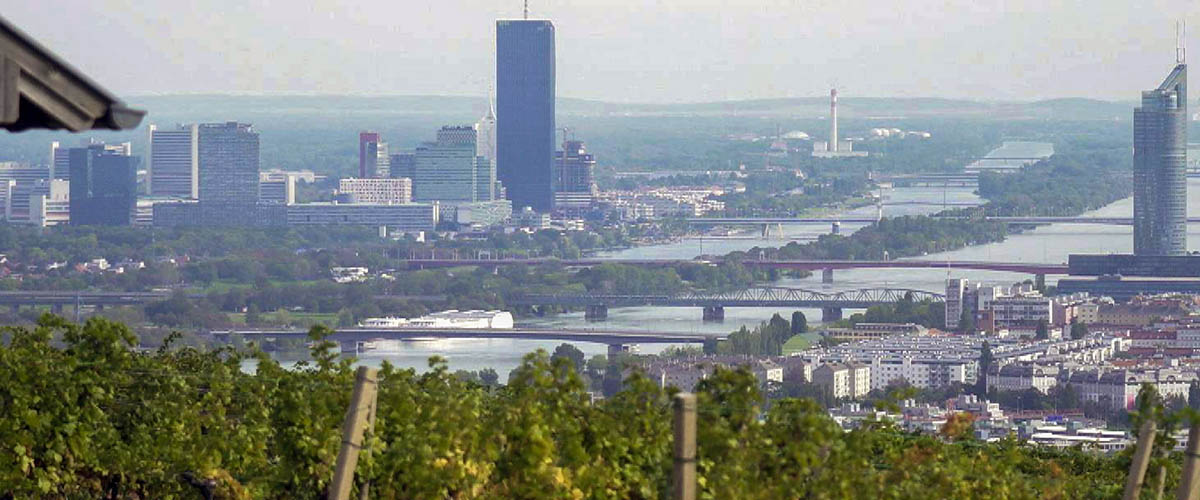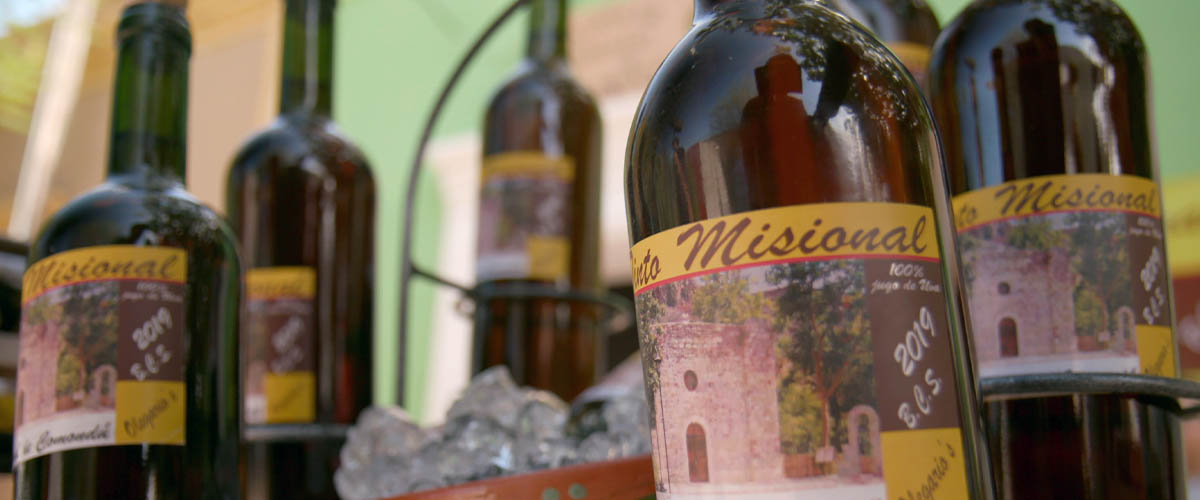hr television, 9.50 a.m.
Drought, heat, fire - the weather is becoming more and more extreme in France too. In certain regions, it has hardly rained at all for a year and a half. ARD France correspondent Friederike Hofmann travels to the south of France and experiences how the drought is changing the country, how some winegrowers are running out of water, flames are threatening entire regions - and livelihoods are at stake. She accompanies the search for solutions, with local winegrowers and in a laboratory where new varieties are being researched - so that French wine has a future.
 |
ZDF, 0.45 a.m.
Aminata drives out into the countryside, to the Rheingau. There she meets Sophie and Max Egert. The two siblings have taken over their parents' vineyard. The almost ten hectares of vineyards alone have a value in the low six-figure range. The young winegrowers say that it is hardly possible to run a winery without inheriting land. Max and Sophie are aware of their privilege. As they have no plans to sell the winery, being winegrowers means a lot of hard work and risks for them. After all, winegrowing is a back-breaking job and the money they earn is largely spent on new machinery and equipment. The Egerts are also worried about rising energy costs and inflation. They would actually have to raise their sales prices considerably. But will the customer go along with this?
NDR Television, 21.00 hrs
On the island of La Digue, Sony Jaques enjoys a special drink with his friends: Calou. It's a kind of wine that drips from scratched palm blossoms in the oppressive heat. Sony just has to catch it. Using a system of ropes, ribbons and cut-open plastic bottles, he manages to do this without any problems. And within a few hours, while the bottles are still dangling in the trees, the sweet palm blossom juice is transformed into a sparkling, intoxicating drink.
Bavarian Television, 8.15 pm
"Die Närrische Weinprobe" shone in new splendour in 2023: a new stage, the wine cellar bathed in atmospheric light - creating a cosy atmosphere. The Franconian wine tasted good, the atmosphere was great and the actors delighted the audience. "Frech & Frei" shows the best moments and the audience can look forward to familiar artists such as Sven Bach, Doris Paul and Michl Müller.
hr television, 10.30 a.m.
The fertile Okanagan Valley with its many lakes and mild climate offers a completely different landscape. Grey Monk, one of many wineries in this famous wine and fruit-growing region, is located directly on the 120-kilometre-long Okanagan Lake. Canadian wine is attracting more and more attention worldwide.
tagesschau24, 12.15 pm
Traditions mean a lot in Georgia and for centuries it was men who watched over them. Baja Abuladze, however, dances to her own tune. After studying and living abroad, the 27-year-old Georgian decided to return to her roots. These lie in her home village of Meore Obcha in the west of the country. Courageous, full of ideas and stubborn, she began to adapt the craft and tradition of the ancients. She finds support from her grandfather. She founds her company 'Baia's Wine' and relies on the family. Together they produce 7,000 bottles of wine a year. Now, for the first time, the aim is to produce 10,000, grown organically, without chemical fertilisers and matured in quevris, clay pots sunk into the ground. Baia is still confident. But the weather has to hold - and she has to find enough of the few remaining quevris to store the wine in. Entrepreneurs like Baia herald change in Georgia. A generation that seizes its opportunity. How does she succeed? She looks for bridges between the past and the future and trusts the strengths of others. And they help her as the mother of a young daughter, wife and entrepreneur.
3sat, 3.05 pm
Mallorca is often referred to as the "Pearl of the Mediterranean". The interplay of wild nature, hidden oases and vibrant life attracts more and more tourists from all over Europe. Even organic gardener Karl Ploberger cannot escape the magic of this island. He wanders between fragrant pine trees, orange groves and beautiful vines in the hinterland and discovers impressive dream gardens, most of which remain hidden from tourists.
hr television, 3.30 pm
One sentence drives almost all researchers: "Knowledge leads to action!" This means that decisions in politics and for everyone depend on reliable information. Climate researcher Mojib Latif thought so too. But after four decades of scientific work, he realises soberly: "At least in my area of expertise, this principle has turned out to be wrong." But why? In this ARD science documentary by HR and MDR, he wants to find out and find out how climate facts need to be communicated so that they reach us. The documentary features numerous voices from the world of science who analyse the "climate protection drama" from different perspectives. These include Professor Claudia Kemfert from the German Institute for Economic Research, protest researcher Professor Dieter Rucht, as well as the founder of the "Last Generation", Lea Bonasera, and Clara Duvigneau from "Fridays for Future". Mojib Latif also visits the Welsh coastal village of Fairbourne, which is one of the first European villages that could be abandoned due to climate change. In the course of the documentary, it becomes clear why scientific awareness-raising work, for all its clarity, has not led to sufficient climate protection and what hurdles still need to be overcome - not only economic and political, but above all very human ones, of which science now also has a better understanding of how they could be overcome.
3sat, 14.00 hrs
Freiburg is often referred to as the Florence of Germany. Only here is the cathedral called Münster, and there are streams that are truly unique in the world. The medieval water system gives Freiburg's old town a very special flair. Freiburg expert Hans-Albert Stechl shows how to spend an enjoyable day in this green city - which traditionally begins and ends at Münsterplatz. Film author Monika Birk discovers the friendly Baden way of life in the Black Forest metropolis and beyond. Because right on Freiburg's doorstep lies the Kaiserstuhl with its idyllic winegrowing villages.
arte, 16.55 hrs
For millions of years, underwater volcanoes raged off the African coast in the middle of the Atlantic, creating a volcanic archipelago: the Canary Islands. Volcanic landscapes, deserts, forests and deep valleys - each of the seven islands has its own unique character. Plants grow and animals live here that cannot be found anywhere else. Many call the volcanic islands the "Galapagos of Europe". The documentary series invites viewers on an impressive journey of discovery. Lanzarote, the northernmost island of the Canary archipelago, seems like an alien planet. The silhouettes of the rugged volcanic mountains, the black lava fields and the special light make the island appear like a surreal work of art. A place where astronauts rehearse their journey to the moon and man must bow to the forces of nature. The family from Ascensión Robayna cultivate their fields in the flat plain of the neighbouring wine-growing region of La Geria. It is characterised by funnel-shaped pits. The vines grow on fertile lumps of ash, known as lapilli. They originate from the last major eruption in 1730 and only a single vine grows in each funnel. All the work has to be done by hand. It is the perfect symbiosis of man and nature. The programme is available online in the Arte media library from 5 February to 5 May 2024.
ZDFinfo, 10.30 pm
The food industry has brought products from holidays to the supermarkets at home. Sebastian Lege uncovers the tricks behind four popular holiday products. Stuffed vine leaves are one of the specialities that holidaymakers in Greece have come to love. They can now be found in every supermarket around the corner. How can it be that the supposedly fresh ingredients have an eternal shelf life? A case for Sebastian Lege. He recreates the industrially produced vine leaves and reveals the secret of their shelf life.
ARD-alpha, 8.15 pm
From Alpine peaks to the underwater world of the Adriatic, the film shows the many unknown sides of a small country in the heart of Europe, where a close coexistence of man and nature is still possible today. Wine and olives thrive in Slovenia's Mediterranean climate.
arte, 12.40 pm
In Panormos, Mary cooks an old Cretan dish for which she marinates a rabbit in wine and vinegar. She then sautés an onion, adds dried lemon and orange peel, among other flavourings, and fries the rabbit pieces in it. Last but not least, vines, a few sultanas, almonds and some lemon are mixed in.
hr television, 8.15 pm
Many people enjoy long-distance hiking. A camera team accompanies a group on their hike from Bolzano to Trento. The route leads via the Salurnerklause into the Cembra Valley, which is known as an interesting wine region, among other things. In addition, the culinary evenings made the tour a varied and unique experience.
3sat, 3.30 pm
No other Austrian province can boast as many culinary specialities as Styria. Seed oil, horseradish, scarlet runner beans, Styrian cheese, Murbodner beef, Vulcano ham, wine, brandies, apples - the list of products that have become trademarks of Styrian regions is long. It is not for nothing that Styria has been nicknamed "Austria's delicatessen". The "flavour of the land" has become an important economic factor in Styria and a mainstay of tourism.
3sat, 16.00 hrs
In the heart of southern Styria's wine country lies Seggau Castle, which for centuries served as the representative seat of the Styrian bishops and is now home to an education and congress centre. The current bishop, Wilhelm Krautwaschl, still spends the summer months there and the entire complex is a true place of power for him. In the episcopal wine cellar - one of the oldest in Europe - he tastes the mass wine from the castle's own vineyard every year.
3sat, 4.45 pm
The area around Maribor is an insider tip among Europe's wine-growing regions. When work on the vineyards stops at the beginning of winter, it is time to taste the young wines in the small castle of Jarenina - once called "Jaringhof" - which was first mentioned in 1074. Danilo Flakus from the local Dveri-Pax winery takes it upon himself to serve the aperitif from the vineyards north-east of Maribor. The estate has been owned by the Admont Abbey in Upper Styria for more than 800 years. It contributes significantly to the economic survival of the monastery complex in the Styrian highlands, which has long been internationally recognised for its magnificent library - it is the largest monastery library in the world. Admont Abbey and the winery in Jarenina Castle are proof of this: The shared history of Styria and Slovenia lives on.
hr television, 4.45 pm
Theresa is barely an adult when her father, the celebrated Rheingau winegrower Georg Breuer, dies unexpectedly. Theresa decides to save the family vineyard, even though she is not a specialist in the field. She moves back to Rüdesheim, studies viticulture, takes over the business and is successful: she sells her wines in 25 countries and is named "Winemaker of the Year". But now her father's legacy is once again in danger: climate change is threatening the estate's best vineyards.
3sat, 5.30 a.m.
The historic Golden Pass Belle Époque, a replica of the "Golden Mountain Pullman Express" of the 1930s, is a train in a class of its own. It offers nostalgia, luxury and adventure all in one. Twice a day, it travels from the palm-fringed shore in Montreux to Zweisimmen in the Bernese Oberland. It winds its way through the vineyards of picturesque Lavaux and also passes the historic workshops of the Montreux-Bernese Oberland Railway in Chernex.
3sat, 4.15 pm
The northern part of the Andes in Argentina and Chile offers some superlatives: the Argentinian province of Mendoza is home to the highest peaks in the Andes. Among them is the 6,960 metre high Aconcagua, the highest mountain in the western hemisphere. On the gentle hills of the Argentinian province of Mendoza, millions of grapevines stretch towards the sky. The Incas established irrigation systems there centuries ago.
arte, 18.35 hrs
The largest lake in Central Europe is located in Hungary: Lake Balaton. A holiday paradise with Caribbean warm water in summer, surrounded by picturesque reed belts. An unspoilt natural landscape in autumn and winter, with picturesque vineyards and time-honoured spas. Environmental activists, winegrowers, water buffalo breeders and hydrologists not only sound the alarm, but also point to environmentally friendly alternatives to save the fragile Balaton. On land, a winegrower is trying to protect a Balaton tradition - by developing a sustainable cultivation method that defies herbicides and dry spells. The programme is available online in the Arte media library from 13 February to 13 May 2024.
hr television, 7.20 a.m.
The Kaiserstuhl is a small, island-like elevation in the centre of the Upper Rhine Graben, known for its good wines and sunny weather. Beneath its surface lies an unusual history. Geology is even involved in a relaxing mud treatment: the volcanic rock phonolite not only provides the raw material for wellness treatments, it even produces mystical sounds. Other treasures await discovery in the soil of the Kaiserstuhl: from aromatic truffles to beautiful crystals. Birds travel here from the savannahs of Africa to make their breeding burrows in the loess soil. But how was the loess formed in the first place?
Phoenix, 7.15 pm
Mount Etna is Europe's largest volcano that is not under water. It rises 3,000 metres out of the sea and is the most famous landmark on the east coast of Sicily. The slopes of Mount Etna are among the most fertile in the whole of Italy thanks to the constant rain of ash. This is why the inhabitants of Catania accept the danger - and grow the best oranges and excellent wine there.
WDR Television, 21.00 hrs
Along the Moselle lies one of the most beautiful wine-growing regions in Germany. The steep slopes offer the best conditions for growing grapes. And for a relaxing and enjoyable holiday. No wonder the region is also becoming increasingly popular as a local destination for holidays or a long weekend. There are countless hiking routes through the vineyards, picturesque towns with half-timbered houses and plenty of culinary delicacies to savour alongside good wine. Numerous package deals are on offer - from an extended weekend with a winegrower to a gourmet tour lasting several days. How do you find the right package in the jungle of offers? Do you really save when you book a package holiday? And how varied is a holiday on the Moselle? "Was kostet" presenter Johannes Zenglein checks out package deals and tries out whether he can not only organise his pleasure trip well, but perhaps also more cheaply. He spends five days travelling between Trier and Koblenz. He meets winegrowers who are particularly focussed on the young target group for Moselle tours. On a Segway tour through the vineyards, he gets tips on how to book the offers. At a wine festival near Koblenz, Johannes chats with other Moselle travellers.
 |
3sat, 11.45 a.m.
This documentary presents the South Tyrolean lowlands with their agricultural niche products and culinary specialities. Apple orchards on the valley floor and vineyards on the slopes - this is the South Tyrolean lowlands. The valley floor south of Bolzano and the low mountain ranges to the left and right are part of this region.
3sat, 12.50 pm
Collectives make an alternative working life possible. Two young craftsmen give an insight into their everyday lives and talk about their experiences in the collective. Working on command, always having a boss in front of you - or being self-employed, constantly working and therefore on your own. Not everyone likes that. And so people are looking for alternative working models. The "Ruffini" has been around in Munich since 1978. It is not only a café-restaurant with a patisserie and wine shop, but also the oldest collective in the city.
3sat, 4.00 pm
At the southernmost tip of Europe lies one of Spain's most impressive provinces: Andalusia. A television team travelled through this region and found "50 reasons to love Andalusia". Sights such as the Plaza de España in Seville and the Alhambra fortress in Granada as well as delicacies such as sherry and Spanish cured ham make the region so popular with visitors. Visitors to Andalusia can sample fine delicacies. In addition to the famous Iberian ham and Spanish olive oil, sherry has its origins there. It has become a classic in the city of Jerez de la Frontera. In the city of Málaga there is another speciality: ajoblanco - cold garlic soup.
3sat, 1.20 pm
The "Dream Places" series takes us to the most beautiful places in the world. This episode takes us to the Loire Valley. It is known for its fairytale castles and excellent wines.
.jpg) |
3sat, 21.45 hrs
With restored carriages from the 1920s and a reactivated, 100-year-old steam locomotive, the "Treno Natura" runs through the most beautiful landscapes of southern Tuscany. The old railway line runs from Siena through the Val d'Orcia to Montalcino and invites you to discover blooming fields and magnificent country estates from the train. The "Treno Natura" has been snorting past rivers, forests, vineyards, olive groves and medieval villages for more than 25 years.
3sat, 11.45 a.m.
When you think of Frankfurt tradition, the first thing that comes to mind is cider. This is served in the pubs and also in upmarket restaurants. But there are also other traditions. The "Nibelungenschänke" has been a firm favourite in Nordend for over 35 years. The noble Greek continues to cook well and has loyal regulars. In Sachsenhausen, an Austrian restaurant cultivates the tradition of the Heurigen with typical dishes - served in dirndls.
arte, 12.40 pm
With hundreds of hectares of vineyards in the city centre, Vienna, once the capital of the Danube monarchy, is the largest wine metropolis in the world. For centuries, the Viennese have enthusiastically cultivated the hills along the Danube. The fact that they love their vineyards so much is not only due to the fact that they have helped them to become rich - as a counterbalance to the spruced-up city centre with its monumental buildings, the vineyards and their wine taverns have developed into true places of longing.
 |
3sat, 4.05 pm
With "vapore", the "Treno Natura" puffs through the magically lit Val d'Orcia. Gentle hills on which medieval villages are enthroned, cypress avenues leading to romantic country estates, olive groves, fields and vineyards. The small town of Montalcino, famous for its wines such as the famous Brunello, lies on one of the hills. Not far from Montalcino, nestled in an enchanting landscape, lies the Tenuta di Collosorbo. The traditional winery has been in female hands for 25 years. Mother Giovanna and her daughters Lucia and Laura produce outstanding Brunello di Montalcino and Rosso di Montalcino. Terroir and expertise are Collosorbo's formula for success.
arte, 7.25 a.m.
With hundreds of hectares of vineyards in the city centre, Vienna, once the capital of the Danube monarchy, is the largest wine metropolis in the world. For centuries, the Viennese have enthusiastically cultivated the hills along the Danube. The fact that they love their vineyards so much is not only due to the fact that they have helped them to become rich - as a counterbalance to the spruced-up city centre with its monumental buildings, the vineyards and their wine taverns have developed into true places of longing.
3sat, 2.15 pm
Croatia has experienced a real boom in recent years: cosy bays, vineyards, large forests, lakes and buildings of cultural and historical value are responsible for this. Follow in the footsteps of Winnetou and discover the green heart of the country on the Adriatic coast. Wine routes, tradition and old craftsmanship as well as a rich gastronomic offer characterise Croatia from Zagreb via the Plitvice Lakes to the coast of Istria.
arte, 11.25 a.m.
Portugal, famous for its sea coasts, is home to one of the largest reservoirs in Europe: the Alqueva with its vineyards. It has transformed a desert-like area into a lake landscape and today provides welcome irrigation for viticulture and agriculture. Environmentalists, dam operators, winegrowers and farmers show the advantages and disadvantages of such a massive intervention in the geography of a region.
arte, 12.10 pm
The largest lake in Central Europe is located in Hungary: Lake Balaton. The largest lake in Central Europe is located in Hungary: Lake Balaton. A holiday paradise with Caribbean warm water in summer, surrounded by picturesque reed belts. An unspoilt natural landscape in autumn and winter, with picturesque vineyards and time-honoured spas. Environmental activists, winegrowers, water buffalo breeders and hydrologists not only sound the alarm, but also point to environmentally friendly alternatives to save the fragile Balaton. On land, a winegrower is trying to protect a Balaton tradition - by developing a sustainable cultivation method that defies herbicides and dry spells. The programme is available online in the Arte media library from 13 February to 13 May 2024.
arte, 9.50 am
Oases are lush gardens in the middle of the desert and more than just a "gift" from nature: Their ecosystems bear witness to the knowledge and skill of those people who created them long ago. Today, their descendants are trying to adapt these sensitive and fragile systems to current conditions. Los Comondú is one of 120 oases in America, located in the 1,200 kilometre-long desert in Mexico's Lower California. It only rains here a few days a year and the temperature reaches up to 50 degrees Celsius. Nevertheless, water flows in Los Comondú, so that the first European settlers were able to conquer this part of America - and even achieve the miracle of growing wine in the desert.
 |
3sat, 11.45 a.m.
It's not just wine that matures in the cellars beneath the earth of the Rheingau: in a vaulted cellar at Schloss Reinhardshausen, there's a smell of something completely different: The Rheingau affineur works here. Master cheesemaker Reiner Wechs refines the finest cheeses here. The Rheingauer Runde, Rheingauer Zisterzienserkäse, Rheintaler and many more mature here - delicious with wine. Meanwhile, at Vaux Castle, the focus is on a sparkling pleasure - sparkling wine. At an event organised by the "Rheingau Gourmet & Wine Festival", guests are welcomed with an aperitif in the cellar and can take a look behind the scenes of sparkling wine production. During the subsequent menu by star chef Sebastian Lühr, they can experience how well the sparkling wine goes with the food. A culinary, enjoyable and interesting lunch in the Bel Etage of the beautiful villa.